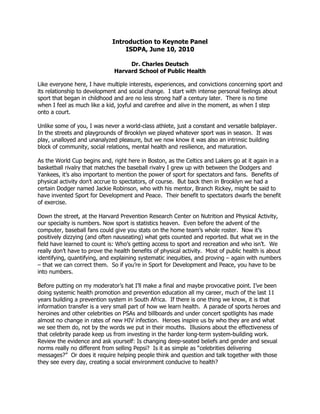
Charles deutsch introduction to keynote panel
- 1. Introduction to Keynote Panel<br />ISDPA, June 10, 2010<br />Dr. Charles Deutsch<br />Harvard School of Public Health<br />Like everyone here, I have multiple interests, experiences, and convictions concerning sport and its relationship to development and social change. I start with intense personal feelings about sport that began in childhood and are no less strong half a century later. There is no time when I feel as much like a kid, joyful and carefree and alive in the moment, as when I step onto a court.<br />Unlike some of you, I was never a world-class athlete, just a constant and versatile ballplayer. In the streets and playgrounds of Brooklyn we played whatever sport was in season. It was play, unalloyed and unanalyzed pleasure, but we now know it was also an intrinsic building block of community, social relations, mental health and resilience, and maturation. <br />As the World Cup begins and, right here in Boston, as the Celtics and Lakers go at it again in a basketball rivalry that matches the baseball rivalry I grew up with between the Dodgers and Yankees, it’s also important to mention the power of sport for spectators and fans. Benefits of physical activity don’t accrue to spectators, of course. But back then in Brooklyn we had a certain Dodger named Jackie Robinson, who with his mentor, Branch Rickey, might be said to have invented Sport for Development and Peace. Their benefit to spectators dwarfs the benefit of exercise.<br />Down the street, at the Harvard Prevention Research Center on Nutrition and Physical Activity, our specialty is numbers. Now sport is statistics heaven. Even before the advent of the computer, baseball fans could give you stats on the home team’s whole roster. Now it’s positively dizzying (and often nauseating) what gets counted and reported. But what we in the field have learned to count is: Who’s getting access to sport and recreation and who isn’t. We really don’t have to prove the health benefits of physical activity. Most of public health is about identifying, quantifying, and explaining systematic inequities, and proving – again with numbers – that we can correct them. So if you’re in Sport for Development and Peace, you have to be into numbers.<br />Before putting on my moderator’s hat I’ll make a final and maybe provocative point. I’ve been doing systemic health promotion and prevention education all my career, much of the last 11 years building a prevention system in South Africa. If there is one thing we know, it is that information transfer is a very small part of how we learn health. A parade of sports heroes and heroines and other celebrities on PSAs and billboards and under concert spotlights has made almost no change in rates of new HIV infection. Heroes inspire us by who they are and what we see them do, not by the words we put in their mouths. Illusions about the effectiveness of that celebrity parade keep us from investing in the harder long-term system-building work. Review the evidence and ask yourself: Is changing deep-seated beliefs and gender and sexual norms really no different from selling Pepsi? Is it as simple as “celebrities delivering messages?” Or does it require helping people think and question and talk together with those they see every day, creating a social environment conducive to health? <br />Because if that’s what it takes, then nothing creates those repeated, spiraling opportunities better than sport, and nothing so well lends itself to memorable, durable metaphors, analogies and images. Let’s do what matters, not what’s easy. Brand visibility is attractive to sponsors but long-term change comes from sustainable institution-building.<br />It is now my honor to introduce our four panelists. In the interest of time, I’ll condense their bios – you can see a fuller version in the program. Then they’ll each speak for about ten minutes. Then we’ll give them time to react to their fellow panelists, maybe elaborate, maybe differ; and then open up to your questions and comments.<br />Detlef Dumon is Executive Director of the International Council of Sport Science and Physical Education. Previous to joining ICSSPE, Detlef was a lecturer in linguistics and didactics at the University of Ostrava in the Czech Republic. His academic background is in linguistics and journalism.<br />Usha Selvaraju is Web Editor for the International Platform on Sport and Development. She has been active in the field of Sport & Development since she joined the Swiss Academy for Development in 2006, where she is involved in a variety of S&D-related projects. Usha has previous experience working for children’s rights organizations in Switzerland and India.<br />Dr. John Sugden directs the University of Brighton’s Football for Peace program and established its academic program in sport journalism. He’s also Visiting Professor at the University of Ulster in Northern Ireland. His award-winning research has focused on the politics and sociology of sport, including studies of FIFA and football’s underground economy. A leading authority on sport in divided societies, John is Editor of the International Review for the Sociology of Sport. <br />Eric Dienes is Liaison Officer in the New York office of the United Nations Office on Sport for Development and Peace, where he is also the thematic focal point for the issue of sport and peace. Prior to this position, he was Assistant Program Specialist for Goodwill Ambassadors and Arab Funding Sources in the Cabinet of the Director-General of UNESCO. Eric studied Political Science, Media and Communication at universities in Germany and France and has a background in journalism.<br />